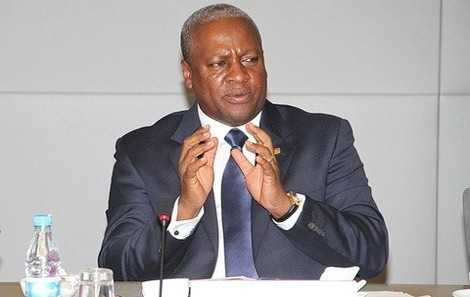 President John Dramani Mahama has opened up on the challenges facing the Ghanaian economy – a development that has compelled the country to sign up to a $940 million three-year credit facility with the International Monetary Fund (IMF).
President John Dramani Mahama has opened up on the challenges facing the Ghanaian economy – a development that has compelled the country to sign up to a $940 million three-year credit facility with the International Monetary Fund (IMF).
In an interview with the Financial Times (FT), which was published Thursday, President Mahama acknowledged that it was time for resolute action to save the economy.
Explaining why Ghana’s GDP growth fell from a high of 14.4 per cent in 2011 to a projected 3.9 per cent growth in 2015, the President pointed to overspending, which he said had been occasioned by high public sector wage bill and other critical government expenses.
He said payment of the wage bill – which formed 72 per cent of government expenditure in 2012 — and huge energy subsidy bills had fuelled fiscal deficits that crippled the economy.
According to him, things began to go wrong for the economy when, following high growth in 2010 – fuelled by a boom in commodity prices and the commencement of oil production in Ghana – the government felt the need to give workers better remuneration.
The FT quoted President Mahama as saying: “As the economy grows you want to remunerate the public sector better to motivate them?.?.?.?you want to put in infrastructure, you want to do a lot of things?.?.?.?You can pile on debt quite quickly.
“Any shocks in the international [commodities] market affect you. And that’s exactly what happened to Ghana,” Mr Mahama said. “After 2010, we suffered a severe drop in cocoa prices?.?.?.?then the gold price collapsed?.?.?.?then oil, too.”
President Mahama, however, stressed that his government was committed to cutting back on spending to reduce the fiscal deficit and stabilise the economy.
“It [the fiscal crisis] was created by a series of factors and it is taking some time to resolve. It comes with a lot of pain and sacrifice. “But there is [now a] commitment to ensure we level out the economy and stabilise it — and keep it stable. It is something all Ghanaians are focused on and willing to do,” he said.
The President went on to pledge not to raid the government chest to finance his campaign ahead of the 2016 General Election.
“We have a commitment?.?.?.?even in an election year. We must keep expenditures under control, we must make sure we increase revenues and keep wages under control,” he said.
Ghana’s deal with the IMF is expected to boost efforts to restore fiscal balance and fuel a transformation of the economy, according to Finance Minister, Seth Terkper.